Although MobiHealthNews published a crowdfunding roundup just two weeks ago, already, several more devices have cropped up on Indiegogo and Kickstarter. One device that launched an Indiegogo campaign recently, called Xmetrics, also announced a funding raise last week.
Almost all of the devices listed offer activity tracking features, but most also have a significant emphasis on coaching, insights, and technique for the device wearers.
Read on for six of the latest digital health products to crowdfund their devices:

Xmetrics has developed a small device that hooks into the back of the swimmer’s goggles. It counts strokes, measures how long the workout session lasted, and provides near real-time audio feedback through attached headphones on the number of strokes, lap time, and quality of turns. Data from the device is sent to a companion app, which offers a dashboard view of how well swimmers are progressing compared with their goals. All data collected within the app can be shared with coaches or fellow swimmers. The funding from the campaign will go towards finalizing the industrialization of the product and building the first fully working beta samples.
If the company reaches its stretch goals, it will begin working on the next generation of Xmetrics, which will include other training aspects, such as open water swimming. According to their Indiegogo page, there are two paid apps the user can purchase. Xmetrics Fit offers fixed audio feedback and has a suggested retail price of $199, while Xmetrics Pro offers customizable audio feedback and has a suggested retail price of $299.
The campaign has so far raised $3,708 of its $100,000 goal. They have 41 days remaining in the campaign.
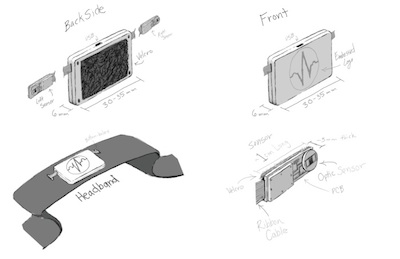
Health device developer Oxirate is crowdfunding BodyEcho, a head-worn sleep sensor. The device measures heart rate, oxygen saturation, movement, temperature, and breathing to monitor the user's sleep. Data from each night is sent to a companion app, which helps users compare results from past nights. Some sleep facts that the app offers include how long it took to fall asleep, how the user breathed while asleep, how much REM sleep the user received, and what the user's optimal sleep length should be.
The funding from the campaign will go towards completing the industrial design for the device and putting it into production as well as making a useful UI for the app. Oxirate also wants to use some funds to create an SDK to release to the developer community. The company expects the device to cost $100.
The campaign has so far raised $8,575 of its $100,000 goal. They have 42 days to go in the campaign.
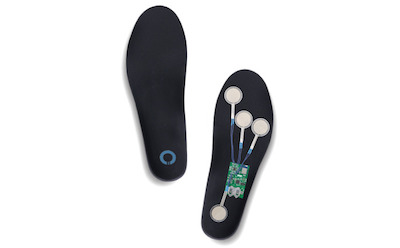
UniverSole has developed sensor-laden insoles that track steps taken, calories burned, and how how users moves on their feet. The device can provide feedback when people are running, cycling, walking, or even if they are standing around. Data from the sole will be sent to a companion app, which will be available on iOS or Android devices.
With the funding from Kickstarter, UniverSole said they will be able to finalize their production mode and start manufacturing the products so that they will be available next year.
So far, the company has raised $445 of its $75,000 goal. They have another 33 days in their campaign.
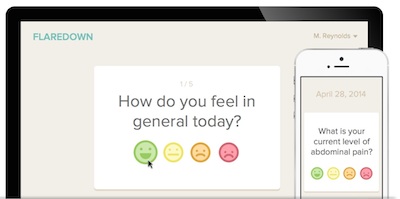
This program, which works on desktops or mobile devices, aims to help people manage their chronic conditions. The user checks in daily to answer questions that Flaredown asks. Users can also leave notes each day and hashtag things that they want to keep track of, like #stressed. According to the Indiegogo page, the program then "crunches the numbers" based on formulas created by medical researchers to create a visual history of the user's health. When the user wants to know what's triggering their condition, they can go back through their history to see what caused previous incidents.
Currently, Flaredown offers specific support for Crohn's disease and rheumatoid arthritis and general support for other chronic conditions. The company expects to start a closed beta in December 2014 and launch by March 2015.
So far, Flaredown has raised $15,727 of its $25,000 goal. They have 27 days left.
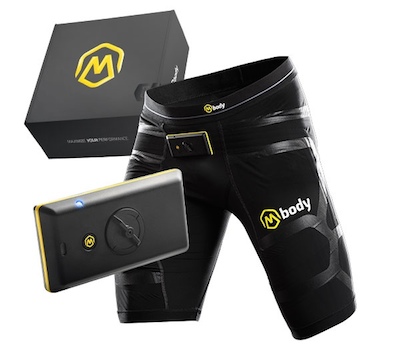
Myontec’s Mvody Coach sensor-embedded shorts are designed for athletes, and they measure the user’s muscle load, heart rate, cadence, and balance ratio. A connected app offers the users audio coaching tips. The app may tell users to warm up for longer or concentrate on technique in order to optimize a training session. After the workout, the app offers exercise comparisons, review, and social sharing.
Myontec will use the funding to develop content for the app, work on the algorithms, and release an iOS and Android app. The company expects the device to retail for $499.
So far, the campaign has raised $13,692 of its $99,000 goal. They have 20 days remaining.
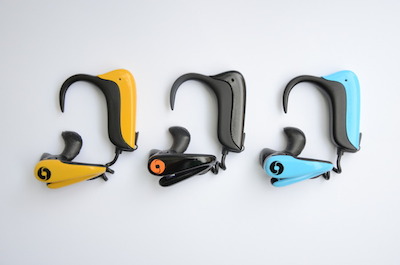
SensoTrack has developed an on-ear activity tracker that senses heart rate, blood pressure, oxygen saturation, and respiration rate. It sends the data to a companion app, which enables users to download workouts, share running routs, and receive suggestions for their next workout. The system will cost $245.
So far, SensoTrack's campaign has raised $5,422 of its $250,000 goal. They have 56 days until the campaign ends.















